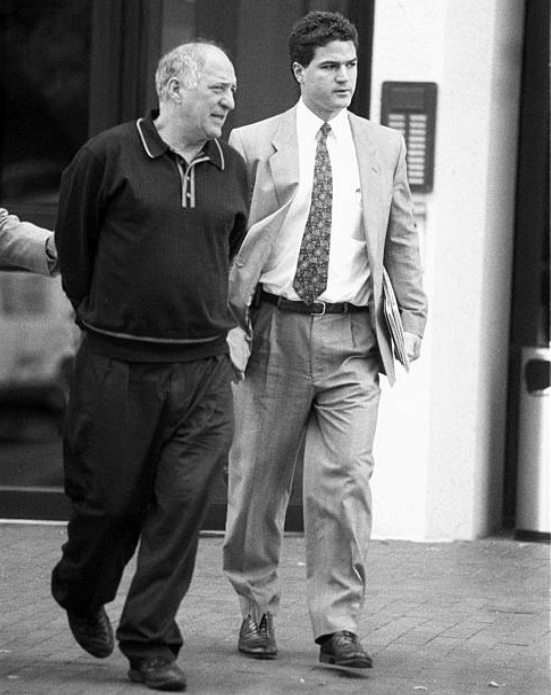Modern day mob plagued by management problems and lousy recruits

The kiss of death for mob families isn’t necessarily from gang wars or
snitches. These days, organized crime is further threatened by
mismanagement, lousy hires, and half-baked succession plans.
Former mob investigators point to the case against Andrew Russo, the man
federal prosecutors say heads the Colombo crime family, one of the five
gangster clans that ruled the New York underworld for much of the last
century.
The alleged management problems of the Colombo leader seem to mirror
those of Tony Soprano, the fictional boss of the television mafia who
struggled to choose a successor and keep his hands off the dirty work.
Mr. Russo was arrested on September 14 in a crippling takedown of the
Colombo family’s executive leaders and middle managers. Prosecutors said
in court documents that Mr. Russo, his deputy chief, consigliere,
several captains and other subordinates carried out an alleged scheme
for two decades to extort money from a New York City union and related
health fund.
In hindsight, Russo’s executive mistakes included micromanaging
subordinates and, at 87, hanging on to his job too long, said Scott
Curtis, a former agent with the Federal Bureau of Investigation who
investigated the family operation for years.
“I can’t walk away. I can’t rest, ”Russo said in one of his
conversations secretly recorded by the FBI over the years and revealed
in court documents.
Curtis, who is not involved in the court case, said Russo did not follow
the best business practices established by past generations of bosses:
maintaining a healthy distance between mischief and boss.
Russo, nicknamed “Mush,” was too practical, Curtis said. Prosecutors
said in court documents that the alleged Colombo leader, who has seven
previous convictions, knew the heart of the alleged crackdown.
“That’s why you see some of these guys getting arrested repeatedly,”
said Curtis, who now works as vice president of investigations at
Madison Square Garden Entertainment Corp. “They have to get their hands
on all these minute details of the plan. “
That predisposes them to failure, he said, that is, to jail. Mr. Russo
has pleaded not guilty to nine criminal charges, including charges
spanning racketeering, extortion, money laundering, and conspiracy.
Curtis said the high-level micromanagement in the Colombo case reflected concerns about the incompetence of lower-level members.
A new generation of savants did not properly learn the business,
according to former government researchers. Older members complain that
millennials, who grew up in the suburbs rather than on city streets, are
softer, dumber, and not as loyal as gangsters of the past. Also, they
are always texting.
“Everything is on the phones with them,” said a former Colombo family
member who knows some of the men accused in the case. A Colombo
associate is accused of sending threatening text messages to a union
official over extortion charges.
“Hey, this is the second text, there is not going to be a third,” wrote the associate, according to court records.
“I’m sure that’s frowned upon in mob circles,” former FBI agent and
crisis management consultant Richard Frankel said of what appeared to be
incriminating texts.
In the mid-20th century, the five New York mob families “operated like a
McDonald’s franchise,” said Jerold Zimmerman, professor emeritus at the
Simon Business School at the University of Rochester.
Illegal businesses, such as gambling houses, trafficking in illicit
goods and corruption involving unions and construction companies, are
operated independently, he said. Those in charge paid a portion of the
proceeds to the boss, who kept the peace and handed out promotions, said
Dr. Zimmerman, one of the authors of a book on business practices in
New York criminal families.
One reason for the mafia’s decline is the FBI’s prosecution of organized
crime in the 1980s and 1990s, which resulted in the arrest and
conviction of hundreds of experts. All five families are still
operating, but their market reach has been reduced and membership has
suffered.
Gangsters are trying to keep a low profile by reducing violence. “They
certainly don’t kill people like they used to,” said Michael Gaeta, a
former FBI agent who spent 13 years investigating organized crime in New
York. “At the end of the day, it draws too much heat.”
The United States Attorney’s Office for the Eastern District of New York
lobbied to keep Mr. Russo behind bars while awaiting trial by
presenting transcripts of recordings that they allege show him as a
danger to society. Jeffrey Lichtman, Russo’s attorney, said the
recordings were more than a decade old.
“In terms of danger, he’s an 87-year-old man and they are relying on tapes from 11 years ago,” Lichtman said.
A spokesman for the U.S. attorney’s office declined to comment.
Some alleged Colombo members appear to have been pining for an administrative shakeup, court documents show.
Prosecutors allege that Colombo leaders at a meeting at a Brooklyn
restaurant last year decided that Russo would eventually be replaced by
Theodore Persico Jr., the nephew of Carmine “The Snake” Persico, a
long-time suspected Colombo crime boss. Mr. Persico died while
serving a sentence in federal prison two years ago at age 85.
Persico Jr., also a defendant in the current case, has pleaded not
guilty. His attorney did not respond to a request for comment.
Prosecutors said a recording of the investigation captured a suspected
Colombo soldier saying extortion from the union would be “easy” once
Persico took control of the family. “The guy is the best man in the
world to deal with,” she said, according to transcripts of court
documents.
In another transcribed recording, the soldier regretted that Mr. Russo
had no intention of resigning. “The problem is that this old man wanted
to be the boss all his life,” he said.
https://www.wsj.com/articles/lousy-management-knucklehead-hires-plague-operations-of-real-life-sopranos-11633360973?mod=searchresults_pos1&page=1







0 comments:
Post a Comment